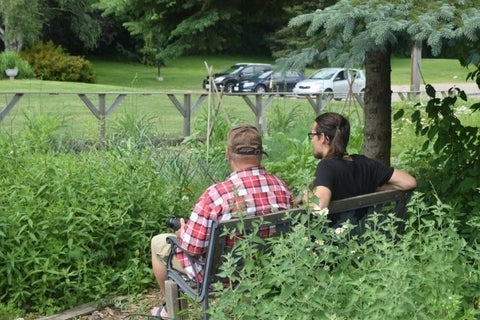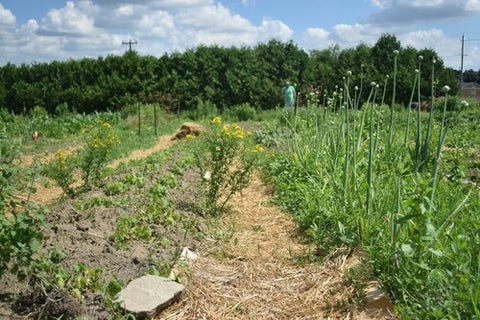Wisahkotewinowak Indigenous Garden: learning and living from the Land
Wisahkotewinowak is an urban Indigenous Garden Collective in the Waterloo-Wellington Region working to build Land-based relationships. They are a diverse group of Indigenous (First Nation and Métis) and settler-allies. Collectively, with the wider community and our non-human kin (the Land, plants, animals, and spirit), they nurture four gardens: a Produce Garden, a Three Sisters Garden, a Teaching Garden, and a Tea Garden.
Found on the University of Waterloo Environmental Reserve, the Produce Garden grows food for cooking, preserving workshops, the Indigenous Student Centre and their weekly food basket program in partnership with the White Owl Native Ancestry Association.
On September 29th, 2022, a fourth-year class from the University of Waterloo (UW) took a trip up to the Wisahkotewinowak Produce Garden.
Communicating with nature
As a part of course on Sustainable Food Systems in Waterloo Region taught by Dr. Steffanie Scott, the students came to the Produce Garden to learn about gardening and relationships with food and Land through an Indigenous lens. The trip was led by Dave Skene (Left), of Métis descent and Co-Executive Director at White Owl Native Ancestry Association, and Mikal Kuzmich, (Right) a Métis Land-Based Educator who encouraged everyone to form a sharing circle to introduce ourselves.
Although the students were familiar with sharing circles, as we have used thismodel in our class this term, Dave Skene offered the opportunity to participate in smudging, a sacred Indigenous practice for cleansing that was new to many of us.
Afterwards, he explained the importance of relationships with the Land and nature. Giving us a pinch of tobacco, an Indigenous medicine which we received with our left hand as it is closest to our heart, he encouraged us to take a moment to connect with a being of nature, whether it be a tree or flower, that we resonated with. To do so, he told us to approach it, introduce ourselves to the being out loud, show our gratitude for its gifts, call it by its name if we could, and offer it the tobacco.
.

Dave Skene (Left) and Mikal Kuzmich (Right) at the Produce Garden (Wisahkotewinowak, n.d.)
I truly enjoyed this [part]. Personally, I chose a tree that had undergone intense color changes with fall and was mesmerizing to look at.
I was drawn to a great oak tree. I thanked the oak for the shade it provided the picnic table next to it, for the acorns it gives the squirrels, and its beautiful, unique leaves.
Sovereignty and responsibility

Dave Skene in the Wisahkotewinowak Produce Garden (Wisahkotewinowak, n.d.)
Indigenous identity is rooted in the Land. Thus, this identity is found in observing, communicating with, understanding, and learning from the Land.
How am I connected to the Land? How am I drawing my identity from the Land? Growing food [is] a part of the answer.
How do we live together? … Everything is committed to the process of giving life and supporting life… How do we support each in living life in a good way.
Growing food becomes an intimate and direct form of Land connection, reinforcing our identity and relationship with the Land and informing how to live. With this identity, there is a responsibility for the Land, food, health, culture, and language among other things. In Indigenous worldviews, there is an agreement between humans, Land, creatures and beyond regarding:
Kincentricity
Wisahkotewinowak upholds a prominent attribute of Indigenous food systems called kincentricity. This refers to Indigenous stories of an “Original Compact” between the animals and humans to honour reciprocal relationships with one another as our direct relative (Enrique Salmon as cited in To the Best of Our Knowledge, 2022). Our hosts told stories of entire crops being eaten by one creature or another. While it may seem disadvantageous, this another way of relating to the Land and its other inhabitants. As a part of this, no chemical inputs are used on the garden plants. In doing so, they practice respect and reciprocity.
Braiding corn and working in the garden
Here, the gardens carry Indigenous varieties, as well as non-native crops from different cultures. As part of engaging with the garden activities, the students participated in husking and braiding corn and weeding. As opposed to sweet corn found in most grocery stores, they grow an Indigenous variety called Haudenosaunee White Corn. Braiding the corn is a technique used for drying the corn on the racks. Normally, there would be a lot more cobs braided together, but the students were allowed to experiment with braiding as seen in the picture below:


Weeding allowed the students to engage with the land physically while contributing to the garden efforts. In doing so, they also interacted with various insects like ladybugs and spiders, learned about various plant species and gained an understanding of how the garden exists within the ecosystem.
Futurity of Land-based relationships in urban settings
The Waterloo Region as an urban center poses challenges for access to land necessary for maintaining Land-based relationships. Initiatives like this garden helps revive Indigenous lifeways and provides green space for the community to build these connections. Dave emphasized that everyone should learn to connect with the Land, regardless of Indigenous descent, and incorporate lessons of the Land in our daily lives.
References
Jorgensen, A. [Martin Luther University College], Skene, D. & McCleary, G. (2020). Food Sovereignty for First Nations, Métis, & Inuit Peoples on Turtle Island. Circle of Dialogue [Video]. YouTube. Retrieved from https://youtu.be/QHbLTVR-9oQ
Wisahkotewinowak. (2022). Wisahkotewinowak: An urban Indigenous garden collective in the Waterloo-Wellington region. Retrieved from https://www.wisahk.ca/
Wisahkotewinowak Produce Garden (Wisahkotewinowak, n.d.). [Image]. Retrieved from https://www.wisahk.ca/
WRCGN. (2022). University of Waterloo Community Gardens. Waterloo Region Community Garden Network. Retrieved fromhttps://sites.google.com/view/community-gardens-ca/gardens/garden-directory/university-of-waterloo-community-gardens
To The Best Of Our Knowledge (2022, March 25). “Anthropologist Enrique Salmon on 'kincentricity.'” [Audio podcast]. Retrieved from https://podcasts.apple.com/us/podcast/anthropologist-enrique-salmon-on-kincentricity/id1613974196?i=1000555280071
